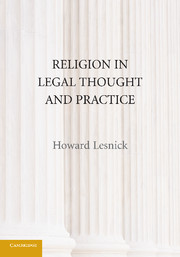Book contents
- Frontmatter
- Contents
- Preface
- I INTRODUCTIONS
- II MORAL OBLIGATION AND RELIGIOUS BELIEF
- III RELIGION AND SOME CONTEMPORARY MORAL CONTROVERSIES
- IV THE INTERACTION BETWEEN RELIGION AND THE SECULAR LAW
- V RESPONDING TO RELIGIOUS DIVERSITY
- VI RELIGIOUSLY GROUNDED MORAL DECISION-MAKING IN PROFESSIONAL LIFE
- 18 Religiously Grounded Decision-Making in Law Practice
- Copyright Permission Acknowledgments
- Authors of Works Reprinted
- Scriptural Passages
- Index
18 - Religiously Grounded Decision-Making in Law Practice
Published online by Cambridge University Press: 05 June 2012
- Frontmatter
- Contents
- Preface
- I INTRODUCTIONS
- II MORAL OBLIGATION AND RELIGIOUS BELIEF
- III RELIGION AND SOME CONTEMPORARY MORAL CONTROVERSIES
- IV THE INTERACTION BETWEEN RELIGION AND THE SECULAR LAW
- V RESPONDING TO RELIGIOUS DIVERSITY
- VI RELIGIOUSLY GROUNDED MORAL DECISION-MAKING IN PROFESSIONAL LIFE
- 18 Religiously Grounded Decision-Making in Law Practice
- Copyright Permission Acknowledgments
- Authors of Works Reprinted
- Scriptural Passages
- Index
Summary
In the secular arena, since the early nineteenth century lawyers have debated the appropriateness of the concept of role morality in determining what one may or ought to do on behalf of a client or prospective client. In Chapter 12, we encountered one aspect of that debate: whether the law should accommodate religiously grounded moral objections to an action that a lawyer would otherwise feel bound by professional norms to take. Here, our primary attention is on the lawyer's own decisional processes where there is not a direct clash with what the law requires or forbids, but where the law allows a professional choice and where there are or may be inconsistent implications with professional norms in the lawyer's considered understanding of the will of God or the norms of his or her faith community.
As the first two readings will make explicit, choices in that connection include but go far beyond a specific action undertaken or contemplated in an ongoing representation. Choices reach to choice of clients, practice specialty, a host of particular interactions with those encountered within and outside of work life, and perhaps most fundamentally, the attitudes toward others and toward the practice of law that one brings to it.
- Type
- Chapter
- Information
- Religion in Legal Thought and Practice , pp. 573 - 606Publisher: Cambridge University PressPrint publication year: 2010

